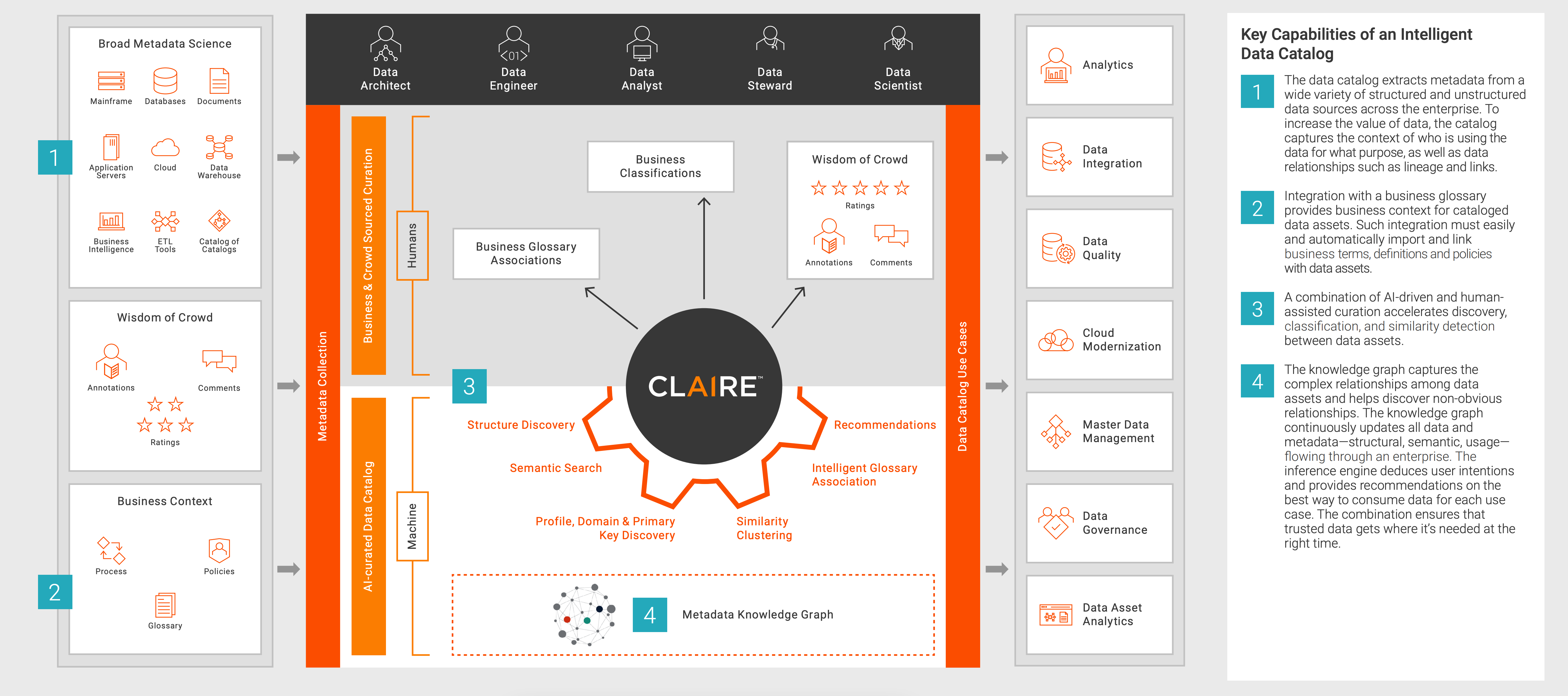Let's take a look at why data catalogs and data dictionaries are necessary. We’ll explain their differences and share how they fit into the greater scheme of metadata management.
What Is a Data Catalog?
Data serves no purpose without meaning. For organizations to make use of data, there needs to be an understanding of what it is, where it came from and its relationship to other forms of data. Data catalogs provide this context. Well-structured data catalogs give users the ability to gain insight from data to make informed decisions.
Data catalogs keep updated records of the origins of data, its lineage, classification and location. Add to that, data across an organization can be identified, classified and organized in one place. From this unified location, data consumers are provided with a comprehensive, meaningful view of data, which is key to confident decision-making.
A data catalog is also a must-have for roles that manage and secure data for a company’s use.
Data engineers are made aware of any changes that can affect the ingestion, cleansing, discovery, classification and organization of data.
Data scientists and analysts need data catalogs to help them obtain the right data assets for their work and to understand the relationships between them.
Data stewards depend on data catalogs to help ensure proper data governance and privacy measures are being adhered to.
What Is a Data Dictionary? How Does It Differ from a Data Catalog?
A data dictionary is similar to a data catalog in that it gives meaning to data. Data dictionaries contain technical information about data assets, such as data sources, fields and data types. They are typically used by technical audiences such as data engineers and data analysts to understand the data.
Data catalogs contain much broader and deeper data intelligence than data dictionaries do. A data catalog is a unified inventory of data assets. It contains a lot of the information found in a data dictionary. The data catalog also keeps record of the additional business context gathered from metadata, including data lineage, business terms, user comments and ratings, and data quality. The additional context helps data consumers understand and trust the data assets that will eventually be leveraged for business insight.
Data Catalog vs Data Dictionary vs Business Glossary
In the search for metadata management capabilities, companies may come across the term business glossary. Before we dive into the business benefits of data catalogs and data dictionaries, let’s clarify what a business glossary is and how it fits into the overall scheme of data management. A business glossary is a repository containing the descriptions of commonly used business terms within an organization. Modern data catalogs contain business glossaries. This allows users to associate the business terms within the glossaries to physical data assets. In this way, business glossaries provide valuable context to the data. In addition to having business glossaries, modern data catalogs typically include data dictionaries as well.
Benefits of a Data Catalog
Well-managed data can give companies a competitive advantage. Leveraging modern data catalog solutions enables organizations to:
- Create solid data migration plans. Understand where data lives, its source and origin. Determine whether the data is fit for use as critical data assets for business needs. Anticipate the downstream effects of migrating those assets.
- Help ensure appropriate governance of data. Identify elements that need governance. Use information including classifications and lineage to help inform, define and enforce governance policies.
- Quickly realize value from data. Data catalogs provide a holistic view of your data. This can ultimately help with business imperatives such as enhancing the customer experience and loyalty programs, minimizing supply chain disruptions, optimizing inventory, speeding up product innovation and more.
- Build trust in data for self-serve analytics. Increase confidence in data by making data more visible and understandable for data consumers.
The Elements of a Good Data Catalog

Data catalog key capabilities
To be most impactful to your business needs, it’s important that data catalogs have certain capabilities to make the most of your enterprise data. See examples in Figure 1. Learn more from our blog about data catalog features & capabilities. Check out our article on machine learning data catalogs for information about how artificial intelligence is aiding the management of data and metadata at scale. You’ll also learn about how companies in different industries are leveraging modern data catalogs to benefit their business.
Additional Resources
Take a deeper dive into metadata management with these resources. Discover modern approaches that help transform data into business intelligence for your organization.
Webinar series: Back to Basics: Data Catalog
Video: Deliver Data Intelligence with Cloud Data Governance and Catalog
Learn more about Informatica’s cloud and AI-powered data catalog solutions.




